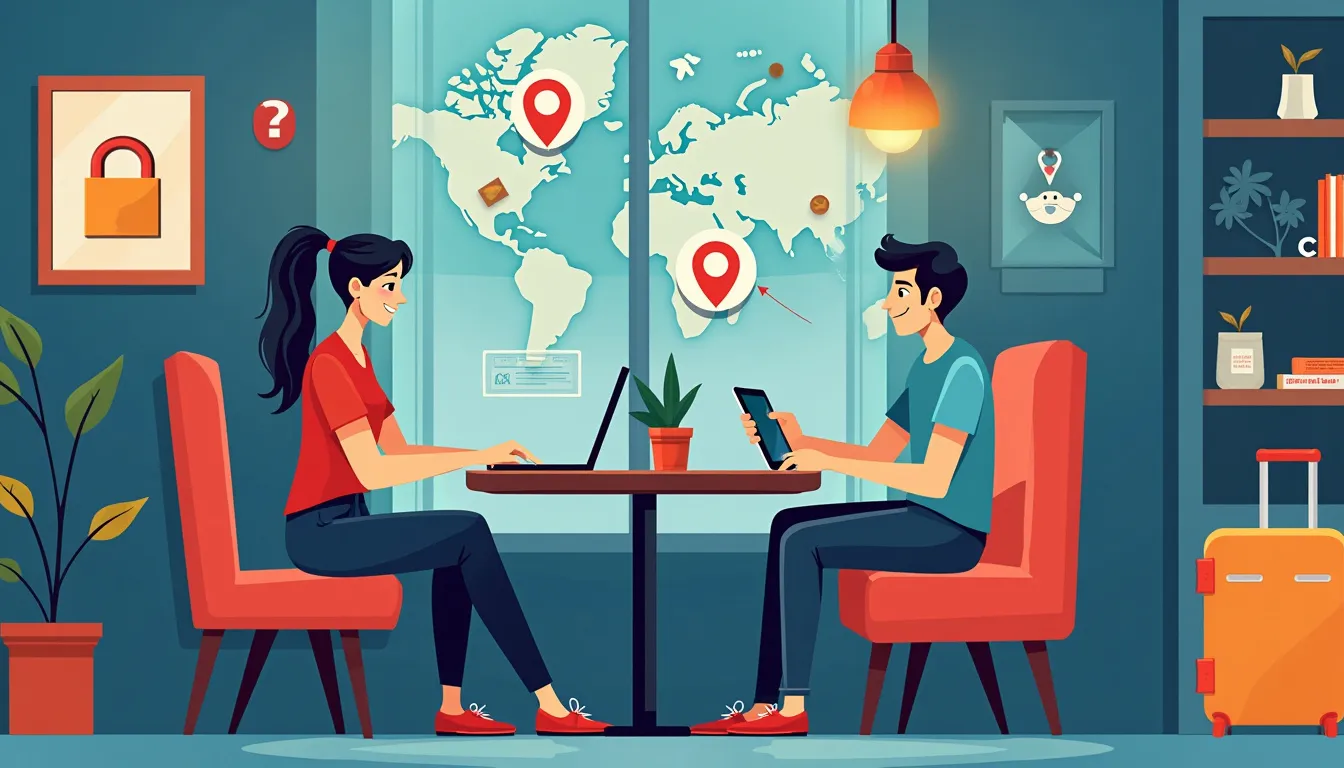In an age where personal information is increasingly vulnerable to surveillance and data breaches, learning how to travel anonymously has become a vital skill for many globetrotters. Whether you’re a privacy-conscious individual or simply looking to fly under the radar, traveling anonymously can offer you peace of mind and an added layer of security. This comprehensive guide will delve into essential practices for ensuring your anonymity from the moment you book your travel arrangements to the various steps you can take to maintain your privacy on the go. By leveraging tools like incognito browsing and VPNs, using pseudonyms, and adopting safe communication methodologies, you’ll discover actionable strategies to protect your personal information and travel incognito. Join us as we explore best practices for anonymous travel, making sure that your adventures remain your own secret.
Essential Tips for Anonymously Booking Your Travel Arrangements
When considering how to travel anonymously, the very first step involves booking your travel arrangements without leaving a digital trace. This requires a combination of strategic online practices and alternative purchasing methods. Below are two critical strategies to ensure your travel bookings remain anonymous: utilizing incognito browsing coupled with VPN usage and opting for pseudonyms alongside anonymous payment methods.
Incognito Browsing and VPN Usage for Anonymity
The internet is a treasure trove of personal data, and accessing travel booking sites can expose a significant amount of this data if not approached with caution. Here’s how to safeguard your privacy:
- Incognito Mode: Most browsers offer a private or incognito mode that prevents your browsing history, cookies, and site data from being saved. Although this mode does not offer complete anonymity, it is a foundational step. To enable this, open your browser settings and select New Incognito Window or Private Browsing.
- VPN Usage: A Virtual Private Network (VPN) encrypts your internet traffic and masks your IP address, making your online actions virtually untraceable. When choosing a VPN service, look for features such as a no-logs policy, strong encryption protocols, and good server diversity. Activating a VPN before booking travel tickets ensures that your IP address is not directly linked to your browsing activities.
- Search Engine Choice: Consider using a privacy-focused search engine like DuckDuckGo, which does not track your search activities. This prevents search history from being used to target advertisements, maintaining greater anonymity.
Using Pseudonyms and Anonymous Payment Methods
Booking travel in your real name and using traceable payment methods can compromise your anonymity. Here’s how to disguise your identity effectively:
- Pseudonyms: While using a different name for your travel bookings, ensure the pseudonym can still be associated with your valid travel documents securely through your airline or accommodation provider. Some travelers use slight modifications of their real names, making it easier to present identification when required.
- Anonymous Emails: Create an email address specifically for travel bookings using a secure platform like ProtonMail. Avoid using your primary email to prevent cross-referencing with other online accounts or activities.
- Anonymous Payment Methods: Opt for payment methods that do not easily reveal your identity:
- Cryptocurrency: Payments through cryptocurrencies like Bitcoin or Monero can offer high levels of anonymity if proper practices are followed, such as using a new wallet for each transaction.
- Prepaid Cards: Purchase prepaid debit cards with cash. These cards do not require personal information and can be used like regular credit or debit cards.
- Disguising OTAs and Booking Engines: Leveraging online travel agencies (OTAs) and booking engines anonymously means avoiding accounts that are tied to your identity. Skip loyalty programs that track activity, and do not sign into your accounts while browsing.
Following these steps for how to travel anonymously when booking travel ensures that your personal information remains protected, mitigating risks of unwanted tracking or data exposure. By combining incognito browsing, VPN usage, pseudonyms, and anonymous payment methods, you establish a solid foundation for anonymous travels.

Maintaining Anonymity While Traveling: Best Practices
Avoid Tracking by Disabling Location Services
When considering how to travel anonymously, one crucial aspect is to avoid tracking. Your digital footprint can be easily traced through location services enabled on your devices. To minimize this risk, start by disabling location services on your smartphone and other devices. Most smartphones and tablets come with built-in GPS, Wi-Fi, and cellular tracking capabilities that can pinpoint your location with remarkable accuracy. Here’s a step-by-step guide on how to disable location services on both iOS and Android devices:
- For iOS: Navigate to Settings > Privacy > Location Services, and toggle the switch to turn off Location Services.
- For Android: Go to Settings > Location, and toggle the switch to turn off location services.
By following these steps, you can significantly lower the chances of being tracked through your mobile devices. Additionally, refrain from checking in on social media platforms or using apps that require location services. This is an added layer of security for those serious about how to travel anonymously.
Safe Communication Methods and Protecting Personal Information
Communicating safely while traveling is another cornerstone of learning how to travel anonymously. Your phone and internet usage can be a goldmine of personal information, which you must protect rigorously. Here are various ways to ensure safe communication while traveling:
Using Encrypted Messaging Apps
To safeguard your conversations, opt for encrypted messaging apps. Applications such as Signal, WhatsApp, and Telegram offer end-to-end encryption that makes it extremely difficult for third parties to intercept your messages. Here’s a quick overview of these apps:
- Signal: Known for its strong encryption and minimal data storage, Signal is highly recommended for anonymous communication.
- WhatsApp: While widely used, it offers end-to-end encryption, ensuring that only you and the person you’re communicating with can read what is sent.
- Telegram: Offers secret chat options that use client-to-client encryption, making your conversations more secure.
Make sure to download and set up these apps before embarking on your journey for maximum security.
Using Public Wi-Fi Safely
While on the go, you might find yourself needing to connect to public Wi-Fi networks. However, these networks are often unsecured and can be a hotbed for hackers looking to intercept personal data. Here’s how you can use public Wi-Fi safely:
- Use a VPN: A Virtual Private Network (VPN) encrypts your internet traffic and hides your IP address, making it difficult for anyone to track your online activities.
- Avoid Sensitive Transactions: Refrain from conducting any financial transactions or accessing sensitive accounts while on public Wi-Fi.
- Use Two-Factor Authentication (2FA): Enable 2FA for your accounts to add an extra layer of security.
Following these guidelines will help you maintain anonymity and protect your personal information while using public internet connections.
Anonymous Browsing
When you’re thinking about how to travel anonymously, don’t overlook the importance of anonymous web browsing. Your browsing history is often tracked and stored by websites, advertisers, and even service providers. To ensure that your online activities remain private, consider the following tools:
- Tor Browser: This browser routes your internet traffic through multiple servers, making it nearly impossible to trace back to you.
- DuckDuckGo: A private search engine that doesn’t track your search history or store your personal information.
- Incognito Mode: Most modern browsers offer an incognito or private browsing mode that doesn’t save your history or cookies.
Utilizing these tools can help you browse the internet discreetly, protecting your identity and activities from prying eyes.
Minimizing Personal Data Sharing
To further explore how to travel anonymously, it’s essential to minimize the amount of personal data you share, whether online or in person. Here are several ways to ensure your data remains as private as possible:
- Use Fake Email Addresses: For occasions where you must provide an email, create and use a disposable email address.
- Avoid Sharing Your Real Name: Whenever possible, use an alias or pseudonym when providing your name.
- Limit Social Media Activity: The less you post about your travels, the fewer digital breadcrumbs you leave behind.
By adhering to these best practices, you can maintain a higher level of anonymity and security during your travels.
In a world where personal data can be easily tracked and monitored, the ability to travel anonymously has become an essential skill for those who value their privacy. By following the strategies outlined in this guide, you can significantly reduce the digital footprints you leave behind, ensuring a more private and secure travel experience.
Starting with the planning and booking stages, adopting practices such as browsing in incognito mode and using Virtual Private Networks (VPNs) can shield your online activities from prying eyes. Employing pseudonyms and anonymous payment methods further enhances your anonymity by disconnecting your personal identity from your travel arrangements.
Once on the move, maintaining your anonymity requires vigilance and adherence to best practices. Disabling location services on your devices prevents unnecessary tracking, and utilizing secure communication methods protects your personal information from potential breaches. By consistently applying these measures, you can enjoy your travels without compromising your privacy.
In conclusion, traveling anonymously is not only possible but also within reach for anyone willing to make informed choices and adopt necessary precautions. By integrating the tips and best practices detailed in this guide, you can navigate the globe discreetly, safeguarding your personal information and ensuring that your journeys remain as private as you desire.







